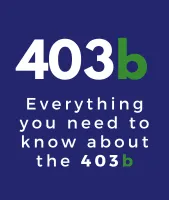Navigating Your Path to Retirement: Expert Advice for Educators
We're here to guide you through the complexities of retirement planning with:
Personalized Planning: Tailored strategies for educators at every career stage.
Diverse Options: Guidance on 403(b),
457(b) plans, and IRAs.
Expert Advice: Informed decisions to maximize your retirement benefits.
Seamless Transition: Support for a smooth and rewarding retirement journey.
Let's secure your financial future together.
Welcome to Retirement
Planning 101 for Teachers
We understand that teachers often have limited time for retirement planning. That's why we have developed a series of study guides to simplify the process of understanding how to maximize the benefits of a 403(b), 457(b), and annuities for your retirement goals.
Explore our extensive reference library ere.
Understanding Your Retirement Plan Options
As an educator, it's crucial to understand the different retirement plans available to you. Each plan offers unique benefits, and choosing the right one can significantly impact your future financial security. Here's a brief overview:
403(b) Plans: Designed for educators and non-profit workers, mirror 401(k)s, offering tax advantages for retirement savings.
457(b) Plans: Available to government and certain non-profit employees, provide another tax-advantaged path for retirement.
IRAs (Individual Retirement Accounts): IRAs provide a flexible option with tax benefits, suitable for anyone looking to supplement their retirement savings.
It's important to consider factors like contribution limits, investment choices, and tax implications when selecting a plan. Our specialists can help you navigate these details to find the best fit for your retirement goals.

Understanding Your Retirement Plan Options
As an educator, it's crucial to understand the different retirement plans available to you. Each plan offers unique benefits, and choosing the right one can significantly impact your future financial security. Here's a brief overview:
403(b) Plans: Designed for educators and non-profit workers, mirror 401(k)s, offering tax advantages for retirement savings.
457(b) Plans: Available to government and certain non-profit employees, provide another tax-advantaged path for retirement.
IRAs (Individual Retirement Accounts): IRAs provide a flexible option with tax benefits, suitable for anyone looking to supplement their retirement savings.
It's important to consider factors like contribution limits, investment choices, and tax implications when selecting a plan. Our specialists can help you navigate these details to find the best fit for your retirement goals.


Tailored Retirement Planning for Educators
Every educator's retirement journey is unique, and a one-size-fits-all approach doesn't work when it comes to retirement planning. Here's how we personalize our services to fit your individual needs:
Career Stage Considerations: Whether you're just starting out, mid-career, or nearing retirement, we offer strategies that align with your current life stage.
Customized Advice: Our experts consider your personal financial situation, goals, and risk tolerance to provide customized retirement planning advice.
Flexible Solutions: We understand that your needs may change over time. Our flexible planning solutions adapt to meet your evolving requirements.
Our commitment is to ensure that your retirement plan not only secures your financial future but also aligns with your personal and professional aspirations. Let us help you create a retirement plan that truly reflects your dedication and hard work as an educator.

Tailored Retirement Planning for Educators
Every educator's retirement journey is unique, and a one-size-fits-all approach doesn't work when it comes to retirement planning. Here's how we personalize our services to fit your individual needs:
Career Stage Considerations: Whether you're just starting out, mid-career, or nearing retirement, we offer strategies that align with your current life stage.
Customized Advice: Our experts consider your personal financial situation, goals, and risk tolerance to provide customized retirement planning advice.
Flexible Solutions: We understand that your needs may change over time. Our flexible planning solutions adapt to meet your evolving requirements.
Our commitment is to ensure that your retirement plan not only secures your financial future but also aligns with your personal and professional aspirations. Let us help you create a retirement plan that truly reflects your dedication and hard work as an educator.
Educator Retirement Plan Types
Gain a comprehensive understanding of your 403(b) choices and optimize their potential advantages.
A 403(b) is a specialized retirement savings plan tailored for public school employees, serving as a complement to your pension and bridging the gap in your retirement income. Normally, contributions to a 403(b) are made pre-tax, allowing for tax-deferred growth within the plan, thereby maximizing the value of your retirement funds. Taxes are only incurred when withdrawing from the plan.
On the other hand, the Roth 403(b), another popular option, operates with a slight variation. Contributions are taxed upfront, but your funds experience tax-free growth and can be withdrawn without tax implications.
Saving in a 403(b) allows you to:

Secure your retirement by taking charge and making direct contributions to a 403(b) savings plan via convenient payroll deductions.-

Build up funds in a tax-advantaged manner to augment your pension or any other retirement scheme. 
Retain full control of your funds, regardless of your destination. Seamlessly transfer your savings to alternative employer plans
or a traditional IRA in the event of a job change.
Discover the inquiries posed by fellow educators and school district staff, and uncover the solutions alongside them.
What is the process for making contributions?
Contributions are conveniently deducted from your paycheck, ensuring a consistent and effortless buildup of your retirement savings. To initiate this process, simply fill out a salary reduction agreement to notify your employer, and contributions will be automatically deducted from your earnings. If you wish to adjust the contribution amount, you can easily do so by completing a new salary reduction agreement. If you require guidance on your employer's specific plan, your financial professional will be able to assist you. In the event that you don't have a financial professional, we are here to offer our support.
What is the maximum amount I can contribute?
Every year, the IRS establishes limits on the amount that can be contributed as deferrals. However, if you are 50 years or older, or if you have been with the same employer for a substantial period, you may qualify for special catch-up provisions. Our team of local financial professionals is available to assist you in determining your Maximum Allowed Contribution through accurate calculations.
What occurs if I switch jobs?
One of the notable advantages of a 403(b) is the level of control it affords, even when transitioning to a different school district. The portability feature enables you to transfer your accumulated funds to your new retirement plan. Alternatively, you have the option to retain your account as is, with the potential for any remaining balance to continue growing tax-deferred.
What if I require funds? Can I access my savings?
Several factors come into play when addressing this inquiry, such as your employment status, age, and the access rules outlined in your employer's plan. To fully comprehend your options and determine the most suitable course of action for your situation, we strongly advise reaching out to your financial professional. They will be able to provide you with the necessary guidance and assistance tailored to your specific circumstances.
Nevertheless, it is essential to be aware of the following information:
- • The IRS has established guidelines regarding the timing and methods for accessing your savings. In times of economic hardship, such as a global pandemic, temporary relief provisions may be implemented.
- • In the scenario where you are presently employed and below the age of 59½:
- - Loan Option: If your plan allows, it is possible to take a loan against the value of your 403(b) account. As per IRS regulations, you can borrow up to half of your cash value, with a maximum limit of $50,000. Generally, loans must be repaid within five years, unless the funds are used for purchasing a home.
- - Hardship Withdrawals: Some plans offer hardship withdrawals to cover unexpected expenses such as medical expenses, funeral expenses and tuition to name a few. Hardship withdrawals are subject to taxes, policy charges and possibly the IRS 10% early distribution penalty.
- • If you have separated from service or are currently employed and over the age of 59½:
- -You have the flexibility to withdraw funds. However, it's important to note that all distributions are subject to taxes, policy charges, and potentially the IRS 10% early distribution penalty.
- -Loan Option: If your 403(b) plan allows it, you have the option to take a loan against the value of your account. According to IRS rules, you can borrow up to half of your cash value, with a maximum limit of $50,000. Generally, loans must be repaid within five years, unless the borrowed funds are used for purchasing a home.
- - Loan Option: If your plan allows, it is possible to take a loan against the value of your 403(b) account. As per IRS regulations, you can borrow up to half of your cash value, with a maximum limit of $50,000. Generally, loans must be repaid within five years, unless the funds are used for purchasing a home.
- - Hardship Withdrawals: Some plans offer hardship withdrawals to cover unexpected expenses such as medical expenses, funeral expenses and tuition to name a few. Hardship withdrawals are subject to taxes, policy charges and possibly the IRS 10% early distribution penalty.
- -You have the flexibility to withdraw funds. However, it's important to note that all distributions are subject to taxes, policy charges, and potentially the IRS 10% early distribution penalty.
- -Loan Option: If your 403(b) plan allows it, you have the option to take a loan against the value of your account. According to IRS rules, you can borrow up to half of your cash value, with a maximum limit of $50,000. Generally, loans must be repaid within five years, unless the borrowed funds are used for purchasing a home.
What choices do I have for saving in a 403(b) account?
You have several options, which may include:
- -Mutual funds, allowing access to professionally managed portfolios of equities, bonds and other securities.
- -Annuities that allow you to accumulate savings before retirement and convert these savings to guaranteed income during retirement.
Talk with a financial professional to help you assess your options and decide what’s right for you.
Understand how a 457(b) fits into your retirement plan.
While examining your employer's available choices, you might come across a 457(b) Plan. A 457(b) plan is an additional retirement plan that provides tax-deferred benefits, implying that you won't pay taxes on your funds until you make withdrawals. This plan offers the advantage of saving on a tax-deferred basis while retaining the flexibility to access your funds through loans or unforeseen emergency distributions if the need arises.
If your employer provides both a 403(b) plan and a 457(b) plan, making the maximum allowable contributions to both can optimize your retirement savings. To navigate this process, our team of financial professionals is available to provide expert guidance and assistance.
The Annuity Advantage
What is an Annuity?
Annuities, such as fixed index annuities, are frequently employed as the preferred savings option within 403(b) plans.
By investing in an annuity, you can build up funds with an insurance company while benefiting from potential interest earnings and growth on a tax-deferred basis. Importantly, this financial vehicle provides the reassurance that you won't experience losses during market downturns.* Once you reach retirement, you have the flexibility to either withdraw funds as needed or convert them into a reliable and lifelong income stream that will never run out.
There are different types of annuities.
 Fixed Annuity — The interest rate is set by the insurance company, ensuring a set rate of growth no matter what the market does.
Fixed Annuity — The interest rate is set by the insurance company, ensuring a set rate of growth no matter what the market does.
 Fixed Indexed Annuity — The policy credits interest based in-part on the change in a market index like the S&P 500,**
Fixed Indexed Annuity — The policy credits interest based in-part on the change in a market index like the S&P 500,**
but protects you from declines in the index since the index strategy will never earn less than 0%. Variable Annuity — The policy provides a choice of investment subaccounts as well as fixed income account options
Variable Annuity — The policy provides a choice of investment subaccounts as well as fixed income account options
that you can direct your payments to. While variable annuities offer the upside potential of the securities market,
they are also subject to the same declines the market experiences, which may result in a loss of principal and interest.
Variable annuities can be offered solely by representatives registered to offer such products through a broker/dealer
by way of prospectus. Investing involves risk, including the potential for loss of principal.
Variable annuities are sold by prospectus. For more complete information, please request a prospectus from
your registered representative. Please read it and consider carefully a product’s objectives, risks, charges and expenses
before you invest or send money. The prospectus contains this and other information about the investment company.
Why a fixed indexed annuity
Fixed indexed annuities are insurance products specifically designed to build up funds for retirement. These annuities provide safeguards against the loss of premiums paid and interest earned in the event of a decline in the underlying index.* They also offer tax advantages and the assurance of a steady income stream during retirement, thereby helping to bridge any gaps in your retirement income. Over the long term, fixed indexed annuities aim to provide potentially higher interest rates compared to fixed annuities.
When you invest in a fixed indexed annuity, you are not directly involved in stock or equity investments. Instead, your interest earnings are partially based on the performance of a specific market index, such as the S&P 500.** This means you can benefit from a rising market while being protected from losses in a declining market. If the chosen index experiences a downturn, you may not earn interest, but the principal value of your annuity will remain intact. Importantly, the minimum interest rate you can earn is 0%.
In today’s uncertain economy, this peace of mind is more valuable than ever.

What is a Guaranteed Lifetime Income Rider (GLIR)? Does selecting it restrict access to annuity funds?
Our annuity products include an optional feature known as a Guaranteed Lifetime Income Rider3. This rider can supplement your base policy and help bridge the retirement income gap by providing a fixed annual income throughout your retirement. Importantly, this income is guaranteed and will continue for as long as you live.
Furthermore, this feature not only ensures lifetime income but also allows access to the remaining accumulation value in the annuity in case your circumstances change.
While the lifetime income withdrawals may gradually reduce the accumulation value over time, if the accumulation value depletes during your lifetime, you will still receive income until your passing. In the event of your demise with remaining accumulation value, it will be passed on to your designated beneficiary.
The Guaranteed Lifetime Income Rider (GLIR), offered in rider form series 20365 or form series 20135(0613), 20136(0613) with endorsement 20380(0116), is an optional addition to certain fixed indexed annuities issued by Life Insurance Company of the Southwest. By choosing this rider at the policy's inception, there is an extra cost involved, and rider charges will continue to be deducted regardless of interest crediting.
Calculate your contribution
Wondering if you're saving enough for your desired retirement? Discover the answer with our simple and efficient calculator. Not only will it provide you with a quick assessment, but it will also highlight any potential gaps in your retirement plan and offer guidance on how to address them.

Calculate your contribution
Wondering if you're saving enough for your desired retirement? Discover the answer with our simple and efficient calculator. Not only will it provide you with a quick assessment, but it will also highlight any potential gaps in your retirement plan and offer guidance on how to address them.

Calculate your contribution
Wondering if you're saving enough for your desired retirement? Discover the answer with our simple and efficient calculator. Not only will it provide you with a quick assessment, but it will also highlight any potential gaps in your retirement plan and offer guidance on how to address them.
Call (888) 375-4074
Email: [email protected]

